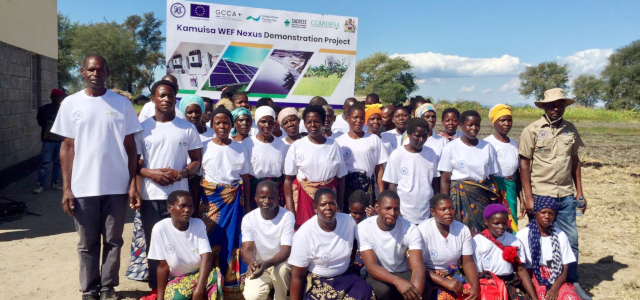The project was established through the Global Climate Change Alliance Plus (GCCA+) Programme which is funded by the European Union. The Malawi project was implemented to the tune of EUR 80,000.
In the SADC region, the GCCA+ Programme aims to build capabilities of SADC Member States to mitigate and adapt to the effects of climate change, in support of the achievement of the Regional Indicative Strategic Development Plan 2020-2030, Africa Agenda 2063, and Sustainable Development Goals (SDGs). Strengthening the capacities of SADC Member States for climate change negotiations and for implementation of the Paris Agreement is the major area of focus for the programme.
In Malawi and Zambia, SADC Centre for Renewable Energy and Energy Efficiency (SACREEE), the Centre for Coordination of Agricultural Research and Development for Southern Africa (CCRADESA), and the Global Water Partnership Southern Africa (GWPSA), collaborated to implement the WEF nexus demonstration projects as prat of the GCCA+ Programme on behalf of the SADC Secretariat
Government officials from the Ministries of Energy & Agriculture, the implementing organisations and the community attended the handover event on 14 July 2023.
“We have tried establishing an irrigation scheme on our own since 2015, but sustainability was a challenge. Through this project, we now have solar power pumping water from the lake and storing it in a tank for irrigation purposes. We can now farm all year round without challenges,” explained Mr. Edward Chikweza, the Chairperson of Kamuisa Irrigation Scheme.
SACREEE provided energy expertise, CCARDESA supported the project with agriculture and food production expertise, while GWPSA provided integrated water resources management expertise. The implementation of the project was a success mainly due to good collaboration amongst the partners, including the community, government, and traditional authorities.
In Malawi, the installed system will support the irrigation of a variety of crops on the 4-hectare piece of land and domestic use. The solar power is also being used for lighting at a nearby primary school, as well as phone and laptop charging.
The community and the government were very pleased with the project. In his opening remarks, Mr. Million Mafuta, Director of Electricity in the Ministry of Energy stated that “This project seeks to promote the interconnections and interdependencies among water resources, energy production, and food production in the country. These three interconnected resources are very important to achieve the Government’s niche for three meals a day for everyone.

Community beneficiaries of the project pose for a group photo
“Malawi has abundant water resources and solar power, which when properly utilised, as demonstrated by SACREEE, can make Malawi food secure and reduce the negative impacts brought about by the use of unsustainable and costly fossil fuel sources. It is pleasing to note that solar-powered water pumps have lower operational costs compared to diesel-powered pumps, making it an economically viable option for farmers in Malawi,” he said. The success of this project has been largely through expertise that various players offered to the project. As implementing bodies, SACREEE was responsible for the energy part, CCRADESA provided the agricultural expertise, while GWPSA handled the water component. The solar panels are generating about 6 kilowatts of power and the tank is storing about 90,000 litres of water. We believe this project will support hunger alleviation efforts and support members in the generation of revenue.
The project has also provided the farmers with various seeds which they will use for two farming cycles. To ensure the sustainability of the project, the farmers joined an organisation called CIAT, which will continue to provide agricultural expertise and also provide a market for the yields from the field. Furthermore, the farmers were trained on how to operate the irrigation scheme and provided with a user manual.
Deborah Muheka, Malawi Coordinator for GWPSA, said it was commendable that water was now being put at the core of climate resilience solutions.
“It is critical that Malawi, just as other SADC nations, begin to look for climate-resilient approaches for more efficient means of achieving water, energy, and food security, and this pilot project has demonstrated that it is doable. Climate change poses several risks to Malawi. The water sector is one of the most vulnerable to climate change because the impact of climate change is first fully felt in this sector through droughts and floods, among others. We have witnessed this in Malawi lately. However, enough attention has not been given to water security as a means of building climate resilience,” said Mrs. Muheka.
The commendable efforts of SADC Secretariat, and its partners, in supporting the demonstration project in Kamuisa village, Malawi, have resulted in significant strides towards water, energy, and food security in the region. By utilising Lake Malawi’s water for irrigation and domestic purposes and harnessing solar power for pumping and lighting, the project has empowered the community to farm year-round, ensuring food resilience, and mitigating the impact of climate change. The successful collaboration among stakeholders and the emphasis on water security as a crucial element of climate resilience demonstrate a forward-thinking approach that can serve as a model for other SADC nations. Through this endeavour, SADC and its partners have taken significant strides towards achieving their developmental goals while promoting sustainable practices and addressing climate change challenges.
With the project now handed over to the community, its management will be overseen by the Ministry of Agriculture on behalf of the community, ensuring its long-term sustainability and positive impact.
